
Simhadri (Telugu:సింహద్రి) is a 2003 Indian Telugu-language action film co-written & directed by S. S. Rajamouli from a story written by V. Vijayendra Prasad & dialogues written by Viswanath & M. Rathnam. The film is produced by V. Vijay Kumar Varma under VMC Productions. The film stars N. T. Rama Rao Jr., Bhumika Chawla, and Ankitha, with Mukesh Rishi, Nassar, and Rahul Dev playing supporting roles. The film has music composed by M. M. Keeravani while the cinematography and editing are done by Ravindra Babu and Kotagiri Venkateswara Rao respectively.
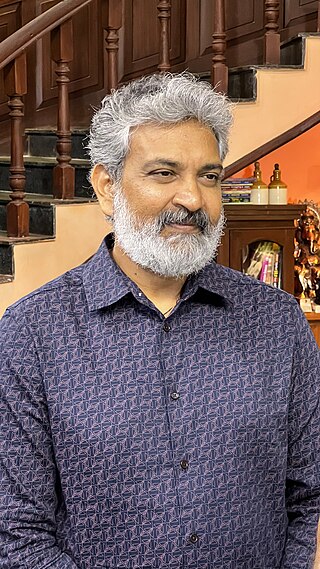
Koduri Srisaila Sri Rajamouli is an Indian director and screenwriter who works primarily in Telugu cinema. He is known for his epic, action and fantasy genre films. He is the highest grossing Indian director of all time, as well as the highest-paid director in India. He is a recipient of various national and international honours including a New York Film Critics Circle award, a Critics' Choice Movie Award, two Saturn Awards, and four National Film Awards. In 2016, the Government of India honoured him with the Padma Shri, for his contributions in the field of art. In 2023, he was included on the Time's list of the 100 most influential people in the world.
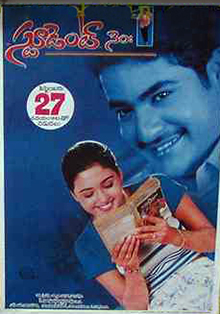
Student No: 1 is a 2001 Indian Telugu-language coming-of-age romantic action film directed by S. S. Rajamouli. K. Raghavendra Rao produced and wrote the screenplay for the film from a story written by Pruthvi Teja and dialogues written by Pruthvi Teja—Viswanth. Student No: 1 marks the directorial debut of Rajamouli in a feature film. The film stars N. T. Rama Rao Jr., Gajala and Rajeev Kanakala. The film was made on a budget of ₹1.85 crore (US$392,000) and earned a distributors' share of ₹12 crore. It was one of the most successful Telugu films of 2001.
Saloni Aswani is an Indian actress and model who appears in Telugu and Kannada films. After finishing her education, Saloni ventured into modelling, appearing in various television advertisements. She went on to pursue a career in acting, debuting in the Hindi film Dil Pardesi Ho Gayaa (2003), following which she starred in several Telugu films, failing to achieve notable commercial success. She gained notice through her performances in Buddhivantha and S. S. Rajamouli's Maryada Ramanna (2010), leading to roles in further major Telugu productions.

Indukuri Sunil Varma, known mononymously as Sunil, is an Indian actor who works predominantly in Telugu films, and has also featured in a few Tamil films. Noted for his comic roles, Sunil has appeared in over 180 films in his career, including a few lead roles. He has won three state Nandi Awards and two Filmfare Awards South. He was widely considered as one of Tollywood's finest comedians during his peak in the 2000s, most known for his distinct laugh and delivery of jokes.

Magadheera is a 2009 Indian Telugu-language romantic fantasy action film co-written & directed by S. S. Rajamouli from a story written by V. Vijayendra Prasad & dialogues written by M. Rathnam. The film is produced by Allu Aravind under Geetha Arts. The film stars Ram Charan Konidela, Srihari, Kajal Aggarwal and Dev Gill. It is themed on reincarnation and eternal love.

Eega is a 2012 Indian Telugu-language fantasy action film written and directed by S. S. Rajamouli. The film was produced by Sai Korrapati's Vaaraahi Chalana Chitram with an estimated budget of ₹30–40 crore. It was filmed simultaneously in Tamil with the title Naan Ee. The film stars Sudeepa, Nani, and Samantha. M. M. Keeravani composed the songs and the background score, while K. K. Senthil Kumar was the director of photography. Janardhana Maharshi and Crazy Mohan wrote the dialogue for the Telugu and Tamil versions, respectively.
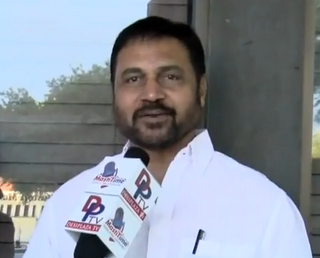
Vellanki Nagineedu is an Indian actor who primarily works in Telugu and Tamil films. He was a general manager at Prasad Labs before S. S. Rajamouli offered him a role in his film Maryada Ramanna. He won Nandi Award for Best Villain for his role.
Shobu Yarlagadda and Prasad Devineni are an Indian film producer duo. They founded Arka Media Works, a film production company known for its works in Telugu cinema and Telugu Television Programs and Shows. Their notable productions include Vedam (2010), Maryada Ramanna (2010), the Baahubali film series (2015–2017) and Uma Maheswara Ugra Roopasya (2020). Yarlagadda and Devineni have together garnered two National Film Awards, two state Nandi Awards, three Filmfare South Awards, two SIIMA awards, one Zee Cine Awards Telugu and a Saturn Award.

Vallavanukku Pullum Aayudham is a 2014 Indian Tamil-language action comedy film directed by Srinath and released by Studio Green on 9 May 2014. A remake of S. S. Rajamouli's successful Telugu film Maryada Ramanna (2010) which was based on Buster Keaton's Our Hospitality (1923), the film was jointly produced by PVP Cinema and Santhanam, who also played the lead role in it, alongside newcomer Ashna Zaveri. The music was composed by Siddharth Vipin.

Rao Gari Illu is a 1988 Indian Telugu-language drama film, produced by Y. Surendra under Annapurna Studios and S. S. Creations banner and directed by Tharani Rao. It stars Akkineni Nageswara Rao, Jayasudha and Revathi, while Nagarjuna has given cameo appearance and music was composed by Chakravarthy. The film is loosely based on the 1965 American film The Sound of Music.

Ivan Maryadaraman is a 2015 Indian Malayalam-language comedy-drama film directed by Suresh Divakar starring Dileep, Nikki Galrani, Nagineedu and Kailash with a supporting cast including Anand, Sudheer Sukumaran, Abu Salim, Santhosh Keezhattoor, Vadivukkarasi, Thara Kalyan, Sunil Sukhada, Ponnamma Babu and Saju Navodaya. The film is produced by Anto Joseph under Anto Joseph Film Company and scripted by Udayakrishna-Siby K. Thomas. This movie is a remake from the 2010 Telugu film Maryada Ramanna, which itself is inspired from Buster Keaton's 1923 silent film, Our Hospitality.

Sarada Saradaga is a 2006 Telugu-language comedy film, produced by G.V.Prasad on Damini Entertainments Pvt Ltd banner and directed by S. V. Krishna Reddy. Starring Rajendra Prasad, Srikanth, Sindhu Tolani, Siva Balaji, Pranathi and music also composed by S.V.Krishna Reddy.
Prabhakar, also known as Kalakeya Prabhakar, is an Indian actor who predominently works in Telugu films along with Tamil, Kannada, and Malayalam films. He is best known for his role as the king of the Kalakeyas in Baahubali: The Beginning (2015). His other notable films include Maryada Ramanna (2010), Dongaata (2015), Jai Simha (2018), Akhanda (2021). As of July 2022, he has acted in over 120 films in five languages.
Supreeth Reddy is an Indian actor who primarily acts in Telugu-language films. He is known for his roles in films like Chatrapathi and Maryada Ramanna. He played villain, and supporting roles.
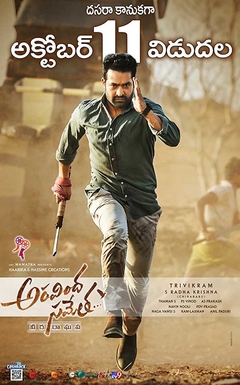
Aravinda Sametha Veera Raghava is a 2018 Indian Telugu-language action drama film written and directed by Trivikram Srinivas. The film stars N. T. Rama Rao Jr., Pooja Hegde, and Jagapathi Babu. It revolves around Veera Raghava, a young man who engages in a violent fight with henchmen from rival village. He escapes to Hyderabad and decides to stay away from violence in order to bring peace between the two villages whose people have been constantly affected by the feud for 30 years. S. Thaman composed the soundtrack, in his official 100th musical composition.
Chandra Sekhar, known professionally as Chatrapathi Sekhar, is an Indian actor who primarily works in Telugu films. He is known for his frequent collaborations with S. S. Rajamouli.
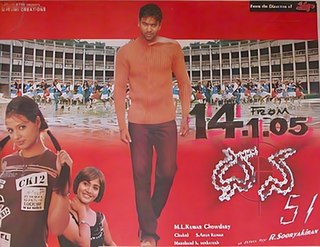
Dhana 51 is a 2005 Indian Telugu-language romantic action film directed by R. Soorya Kiran and starring Sumanth and Saloni Aswani with Mukesh Khanna in a negative role. Structural similarities were found between the plot of this movie and the 2008 Kannada film Bindaas penned by Janardhana Maharshi.
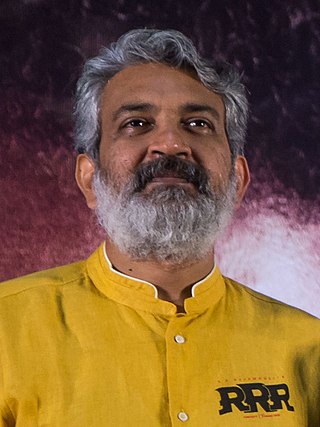
S. S. Rajamouli is an Indian filmmaker who primarily works in Telugu cinema and is known for his action, fantasy, and epic genre films. He is the highest grossing Indian director of all time. He is a recipient of various national and international honours including a New York Film Critics Circle award, a Critics' Choice Movie Award, two Saturn Awards, and three National Film Awards. In 2016, the Government of India honoured him with the Padma Shri, for his contributions in the field of art. In 2023, he was included on the Time's list of the 100 most influential people in the world.

Maryade Ramanna is a 2011 Indian Kannada-language action comedy drama film directed by Guruprasad and starring Komal, Nisha Shah and Mukesh Rishi. The film is a remake of the Telugu film Maryada Ramanna (2010), which itself is based on Our Hospitality (1923).















